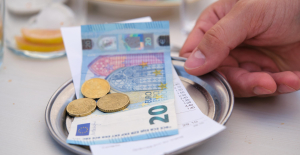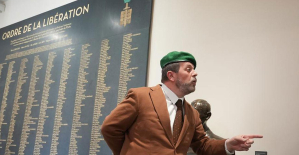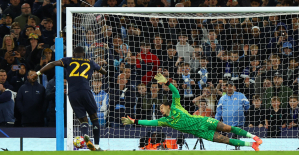Because Herman Flegenheimer (1901-1935) decided to escape his wife Emma and the misery in Manhattan's immigrant neighborhoods, it fell to his son Arthur Simon, his mother, his little sister and himself to get by. He dropped out of school and worked as a newspaper seller. But that yielded little, both financially and in terms of reputation.
So the boy, whose grandparents had still lived in Baden, took his Jewish fellow believers, who were just about to get into big business, as a model. At the age of 17, Flegenheimer went to prison for the first time for breaking and entering. After his release, his career picked up speed, under the new name Dutch Schultz, with which he referred to his German origins on the one hand and paid homage to a criminal role model named Schultz on the other.
Those were golden days for visionary criminals. The First World War brought strong growth to the teetotaler movement. Beer from the breweries, mostly run by ethnic Germans, was considered un-American, and it was hoped that the ban on alcohol would improve public health and reduce criminal activities. As early as January 16, 1919, Nebraska ratified the 18th Amendment to the United States Constitution, which banned the manufacture and trade of intoxicating liquids within the United States.
But since many Americans refused to give up their whiskey, business people who paid little attention to legal requirements stepped in. This brought a new generation of gangsters to power. The Italian families, who still felt bound by centuries-old traditions, were supplanted by modern-thinking mobsters who were not afraid to do business with Jews, for example. Cosa and Kosher Nostra shared the American market.
This opened up opportunities that Schultz was willing to take advantage of. As a bouncer at a Bronx club, he made a name for himself with no-nonsense brutality. He soon rose through the ranks in a gang selling beer on a massive scale from the Bronx. Competitors were consistently eliminated. When his senior partner fell victim to a gang war, he not only launched a vendetta, but in doing so became the master of an organization respected by New York's powerful Italian families.
The way in which Schultz gained respect did the rest. Three years after his death, his attorney Richard Davis revealed how his client had treated Jules "Martin" Modgilewsky, an associate he accused of embezzling $70,000:
"Dutch Schultz had been drinking and suddenly drew his gun. Schultz wore his pistol under his vest and had it tucked into his pants, right on his stomach. One grip on his vest and he had it in his hand. With one quick movement he pulled it out, put it in Jules Martin's mouth and pulled the trigger. It was that simple and undramatic. Just a quick movement of the hand. Dutch Schultz committed this murder with the same indifference as if he were brushing his teeth." When Davies later asked Schultz why Martin's body had been found stabbed multiple times, he was told, "I cut out his heart. Fuck him.”
After Prohibition ended in 1933, Schultz found a new business in gambling. At the same time, however, he was targeted by the law enforcement authorities. After New York's new mayor, Fiorello LaGuardia, declared war on organized crime, his ambitious special prosecutor Thomas E. Dewey (and future presidential candidate) showed his talent for finding justifiable crimes. As with Al Capone, tax evasion proved to be a nice lever for Schultz to put him out of business.
Schultz, who had retired to upstate New York, managed to convince a naive jury of his innocence. But he did not allow his deputy Bo Weinberg, who had run the organization in his absence, that much leniency. Weinberg disappeared and was never seen again.
Although Schultz tried to improve the troubled relationships with Lucky Luciano, the "boss of bosses", and the other large families by converting to Catholicism. But his paranoid thirst for revenge made him misjudge the signs of the times. When Schultz asked the Cosa Nostra umbrella organization to assassinate prosecutor Dewey, he met with a unanimous refusal from the “Commission”. They didn't want to endanger business with a sensational attack.
Schultz's angry announcement that he wanted to take matters into his own hands was deemed by the "commission" to be "contempt of court" and gave Murder, Inc. the assassination contract. This group, run by Brooklyn Jewish gangsters, had hundreds of missions to solve such problems.
On October 23, 1935, Schultz, his accountant Otto Berman, his bodyguard Lulu Rosenkrantz, and his executor Abe Landau were drinking in a back room of the Palace Chop House in Newark, New Jersey, when specialists Charles Workman and Emanuel Weiss entered the establishment. Both immediately opened fire, seriously injuring Berman, Rosenkrantz and Landau. Workman found Schultz in the restroom and shot him in the stomach. All four wounded would not survive the next few hours.
When Lucky Luciano was later asked about the fate of his rival, the ambiguous answer is said to have been: "He didn't bend down low enough when a bullet came at him."
You can also find "World History" on Facebook. We are happy about a like.

 Rishi Sunak wants a tobacco-free UK
Rishi Sunak wants a tobacco-free UK In Africa, the number of millionaires will boom over the next ten years
In Africa, the number of millionaires will boom over the next ten years Iran's attack on Israel: these false, misleading images spreading on social networks
Iran's attack on Israel: these false, misleading images spreading on social networks Iran-Israel: David Cameron wants the G7 to impose “coordinated sanctions” on Iran
Iran-Israel: David Cameron wants the G7 to impose “coordinated sanctions” on Iran New generation mosquito nets prove much more effective against malaria
New generation mosquito nets prove much more effective against malaria Covid-19: everything you need to know about the new vaccination campaign which is starting
Covid-19: everything you need to know about the new vaccination campaign which is starting The best laptops of the moment boast artificial intelligence
The best laptops of the moment boast artificial intelligence Amazon invests 700 million in robotizing its warehouses in Europe
Amazon invests 700 million in robotizing its warehouses in Europe Boeing tries to defuse the long-haul crisis
Boeing tries to defuse the long-haul crisis Solar panels: French manufacturer Systovi announces the cessation of its activities due to “Chinese dumping”
Solar panels: French manufacturer Systovi announces the cessation of its activities due to “Chinese dumping” Tesla: canceled in court, Musk's huge compensation plan will again be submitted to shareholders
Tesla: canceled in court, Musk's huge compensation plan will again be submitted to shareholders Two, three or a hundred euros: who are the most generous customers with tips?
Two, three or a hundred euros: who are the most generous customers with tips? Bruno Vandelli: one year suspended sentence required against the choreographer for corruption of a minor
Bruno Vandelli: one year suspended sentence required against the choreographer for corruption of a minor Jul fills the Stade de France and the Vélodrome in record time
Jul fills the Stade de France and the Vélodrome in record time Immersion among the companions of the Liberation
Immersion among the companions of the Liberation Provence-Alpes-Côte d’Azur releases several hundred thousand euros for the promotion of the work of Marcel Pagnol
Provence-Alpes-Côte d’Azur releases several hundred thousand euros for the promotion of the work of Marcel Pagnol Skoda Kodiaq 2024: a 'beast' plug-in hybrid SUV
Skoda Kodiaq 2024: a 'beast' plug-in hybrid SUV Tesla launches a new Model Y with 600 km of autonomy at a "more accessible price"
Tesla launches a new Model Y with 600 km of autonomy at a "more accessible price" The 10 best-selling cars in March 2024 in Spain: sales fall due to Easter
The 10 best-selling cars in March 2024 in Spain: sales fall due to Easter A private jet company buys more than 100 flying cars
A private jet company buys more than 100 flying cars This is how housing prices have changed in Spain in the last decade
This is how housing prices have changed in Spain in the last decade The home mortgage firm drops 10% in January and interest soars to 3.46%
The home mortgage firm drops 10% in January and interest soars to 3.46% The jewel of the Rocío de Nagüeles urbanization: a dream villa in Marbella
The jewel of the Rocío de Nagüeles urbanization: a dream villa in Marbella Rental prices grow by 7.3% in February: where does it go up and where does it go down?
Rental prices grow by 7.3% in February: where does it go up and where does it go down? Europeans: the schedule of debates to follow between now and June 9
Europeans: the schedule of debates to follow between now and June 9 Europeans: “In France, there is a left and there is a right,” assures Bellamy
Europeans: “In France, there is a left and there is a right,” assures Bellamy During the night of the economy, the right points out the budgetary flaws of the macronie
During the night of the economy, the right points out the budgetary flaws of the macronie Europeans: Glucksmann denounces “Emmanuel Macron’s failure” in the face of Bardella’s success
Europeans: Glucksmann denounces “Emmanuel Macron’s failure” in the face of Bardella’s success These French cities that will boycott the World Cup in Qatar
These French cities that will boycott the World Cup in Qatar Champions League: “It’s painful, but we have to learn,” says Arteta
Champions League: “It’s painful, but we have to learn,” says Arteta Champions League: “Madrid never dies”, says Ancelotti
Champions League: “Madrid never dies”, says Ancelotti Champions League: Manchester City played “exceptionally”, according to Guardiola
Champions League: Manchester City played “exceptionally”, according to Guardiola Champions League: video summary of the Manchester City-Real Madrid clash
Champions League: video summary of the Manchester City-Real Madrid clash


















